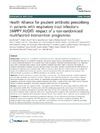Identificador persistente para citar o vincular este elemento:
https://accedacris.ulpgc.es/jspui/handle/10553/74018
| Título: | Health Alliance for prudent antibiotic prescribing in patients with respiratory tract infections (HAPPY AUDIT) -impact of a non-randomised multifaceted intervention programme | Autores/as: | Bjerrum, Lars Munck, Anders Gahrn-Hansen, Bente Hansen, Malene Plejdrup Jarbol, Dorte Ejg Cordoba, Gloria Llor, Carl Cots, Josep Maria Hernández, Silvia González López-Valcárcel, Beatriz Pérez, Antonia Caballero, Lidia von der Heyde, Walter Radzeviciene, Ruta Jurgutis, Arnoldas Reutskiy, Anatoliy Egorova, Elena Strandberg, Eva Lena Ovhed, Ingvar Mölstad, Sigvard Vander Stichele, Robert Benko, Ria Vlahovic-Palcevski, Vera Lionis, Christos Rønning, Marit |
Clasificación UNESCO: | 3212 Salud pública | Palabras clave: | Antibiotic Resistance Nordic Country Clavulanic Acid Bacterial Resistance Antibiotic Prescribe |
Fecha de publicación: | 2011 | Publicación seriada: | BMC Family Practice | Resumen: | Background: Excessive use of antibiotics is worldwide the most important reason for development of antimicrobial resistance. As antibiotic resistance may spread across borders, high prevalence countries may serve as a source of bacterial resistance for countries with a low prevalence. Therefore, bacterial resistance is an important issue with a potential serious impact on all countries. Initiatives have been taken to improve the quality of antibiotic prescribing in primary care, but only few studies have been designed to determine the effectiveness of multifaceted strategies across countries with different practice setting. The aim of this study was to evaluate the impact of a multifaceted intervention targeting general practitioners (GPs) and patients in six countries with different health organization and different prevalence of antibiotic resistance.Methods: GPs from two Nordic countries, two Baltic Countries and two Hispano-American countries registered patients with respiratory tract infections (RTIs) in 2008 and 2009. After first registration they received individual prescriber feedback and they were offered an intervention programme that included training courses, clinical guidelines, posters for waiting rooms, patient brochures and access to point of care tests (Strep A and C-Reactive Protein). Antibiotic prescribing rates were compared before and after the intervention.Results: A total of 440 GPs registered 47011 consultations; 24436 before the intervention (2008) and 22575 after the intervention (2009). After the intervention, the GPs significantly reduced the percentage of consultations resulting in an antibiotic prescription. In patients with lower RTI the GPs in Lithuania reduced the prescribing rate by 42%, in Russia by 25%, in Spain by 25%, and in Argentina by 9%. In patients with upper RTIs, the corresponding reductions in the antibiotic prescribing rates were in Lithania 20%, in Russia 15%, in Spain 9%, and in Argentina 5%.Conclusion: A multifaceted intervention programme targeting GPs and patients and focusing on improving diagnostic procedures in patients with RTIs may lead to a marked reduction in antibiotic prescribing. The pragmatic before-after design used may suffer from some limitations and the reduction in antibiotic prescribing could be influenced by factors not related to the intervention. | URI: | https://accedacris.ulpgc.es/handle/10553/74018 | ISSN: | 1471-2296 | DOI: | 10.1186/1471-2296-12-52 | Fuente: | BMC Family Practice [ISSN 1471-2296], v. 12, Article number 52, (Junio 2011) |
| Colección: | Artículos |
Citas SCOPUSTM
61
actualizado el 08-jun-2025
Citas de WEB OF SCIENCETM
Citations
56
actualizado el 01-feb-2026
Visitas
271
actualizado el 15-ene-2026
Descargas
181
actualizado el 15-ene-2026
Google ScholarTM
Verifica
Altmetric
Comparte
Exporta metadatos
Los elementos en ULPGC accedaCRIS están protegidos por derechos de autor con todos los derechos reservados, a menos que se indique lo contrario.
